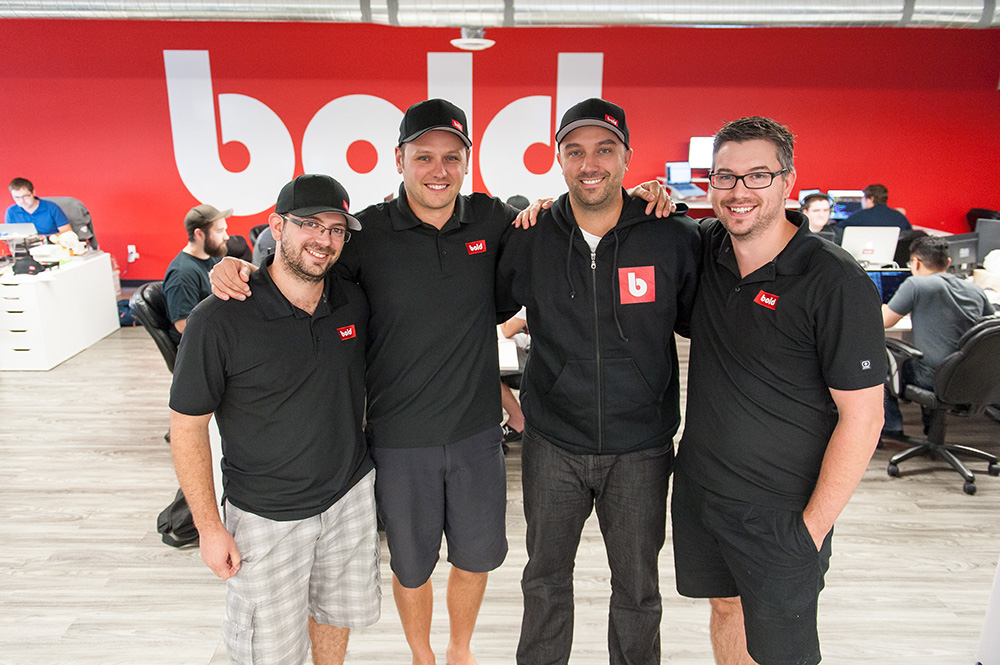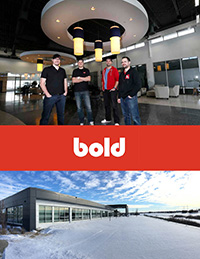Canadian Entrepreneurs Helping Digital Shopkeepers Around The World
By Rajitha Sivakumaran
Bold Commerce is Shopify’s largest app development partner, crafting some of the most successful eCommerce apps available on the market. The success behind this Winnipeg-based company lies in its ability to provide two of the most coveted things in the business world — money and time.
In addition to helping increase sales or reduce the amount of time business owners spend operating their online store, Bold specializes in online store setup, custom-built apps and theme design services and has worked with a number of Fortune 500 companies. As for retail brick and mortar stores, business owners simply need an iPad and a card reader to go along with their online store and they will be able to conduct sales from anywhere with the aid of Bold’s apps.
Apart from having a hand in SEO and social media management, the company is also involved in market research and development, which has produced fine examples of technological solutions like Proximity Innovations. Similar to beacon technology, this uses Wi-Fi to communicate with consumers. If installed in a medical clinic, for example, this technology can give patients in the waiting room access to information. In a restaurant, on the other hand, clients would be able to order through their phone’s Wi-Fi connection.
In 2015 alone, Bold Commerce was named as one of Canada’s Top Small and Medium Employees, and was a finalist for the Spirit of Winnipeg’s Start-Up Business of the Year, awarded by the Manitoba Chamber of Commerce.
Bold’s apps are now used by tens of thousands of people around the world and clients include Rob Gronkowski of the New England Patriots, Cirque du Soleil, Microsoft, Time Life and the LA Lakers. With big-ticket names on their roster, it’s hard to imagine Bold’s modest beginnings in a basement office.
In January of 2013, Bold only had four employees— its founders: Jay Myers, Stefan Maynard, and Eric and Yvan Boisjoli. Myers often tinkered with eCommerce platforms, a habit that was useful for operating his sporting goods company and one day, he came across Shopify. Though he was satisfied with the level of aid Shopify provided its clientele, he believed that a few additions would make the platform an indispensable tool for retail owners. He approached Maynard who was already established as a web designer in the eCommerce space.
Next to join Team Bold were the Boisjoli brothers, who were developers by trade. Their first meeting took place at a Starbucks location as Myers shared an entrepreneurial proposition with his friends. Each had a full-time job when Bold took root and so the motivation behind the startup was to earn a bit of extra money.
“We have a really awesome team here and I don’t mean just the four directors. When we got together, it was a good match because we had different skill sets — we had the two developers, a designer and a marketer. We all have business sense so we had a strong foundation from day one,” Maynard said.
Currently, the company employs over 100 people and Maynard attributes this growth to the team, the products and the company’s commitment to customer service. The latter, in particular, tends to play more of an important role in brick and mortar stores, but Bold has carved out a niche in customer care — 25 per cent of the staff are devoted to tech support.
The company’s first app, Product Upsell, serves the exact function its name suggests. Although the concept was used heavily in brick and mortar stores, the same was not true in the digital marketplace. Bold’s app allowed store owners to upsell products, that is suggest additional related items for purchase, at checkout. “It became very popular very fast because it was the first app at the time that actually directly made store owners money,” Maynard said. Today, it continues to be one of the most sought-after apps on the Shopify platform.
After a success so great, Bold ventured into its second app, which allows vendors to easily manage sales on their online store. In pre-Bold times, retailers had to manually adjust their websites to reflect sales — a massive Black Friday sale entailed a manual change of prices at midnight and a repeat of this process when the sale terminated. The larger a seller’s inventory, the more complicated and time-consuming this process became. The Bold sales app is a powerful retailing tool that lets stores run power hour sales, daily deals, flash sales and other sophisticated sales at pre-set times.
“There were already a handful of apps built for Shopify when we started,” Maynard said. These apps were mainly designed to plug into third-party tools such as shipping companies or accounting software. “As storeowners and businessmen, we looked at it differently and started building tools that would directly impact a store’s bottom line,” Maynard added.
This emic viewpoint allows Bold to pinpoint exactly the needs of digital shopkeepers, and four years of doing this has pushed the company to four new offices, each one bigger than the previous one. Keeping up with growth has become a singular challenge for the company. Despite its rapid growth, the company’s inception was riddled with the usual troubles faced by startups. Bold was founded bootstrap-style with zero investors or outside help. “It’s tough as a small startup company to get recognition and/or help. It’s hard to get noticed in Manitoba as a small startup,” Maynard said.
When Bold first encountered rapid growth, its target markets were in the U.S., the UK and Australia. Consequently, the company was unknown in its home province for a while and this impeded the hiring process. The solution? More involvement in Winnipeg’s local community.
“Innovate faster than they can imitate”
Tech companies can easily spring up without an office or large staff, meaning that a competitor can appear overnight. Bold’s challenge is to continue being a leader in app development in the midst of this competition and the company is doing this by following the motto ‘innovate or die’ and staying on top of trends.
For example, specific to the eCommerce world is the increased popularity of recurring subscription models, whereby subscriptions to products like razor blades or coffee are automatically renewed, charged and shipped to clients every month. Accordingly, Bold released a recurring orders app for Shopify.
“We jump on these trends and build the tools so that store owners can do it,” Maynard said.
A number of other trends are emerging in the online world of commerce, but none is as great or discernible as the impact of social media. Social selling, that is buying through social media platforms like Facebook and Pinterest (via Shopify), has become prevalent.
“Every store owner knows that they should be on Facebook and Instagram and have a YouTube channel,” Maynard said. “But oftentimes they simply don’t have the time to operate a store and market enthusiastically.”
Bold actively helps companies with social media management, which is rapidly proving to be a huge part of its entrepreneurial success at the present time.
“Right now, peer-to-peer recommendation is the biggest thing in eCommerce because people would rather buy from someone they trust and you build that trust through social media,” Maynard said.
www.boldcommerce.com







